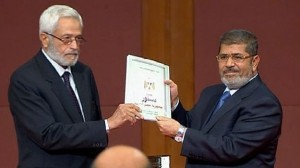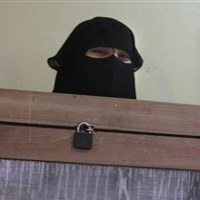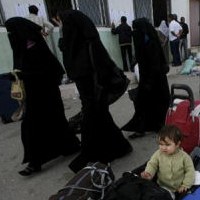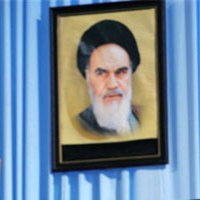![]()
Thu, Dec 13, 2012 | MEForum | by Aymenn Jawad Al-Tamimi
Originally published in The American Spectator.

Egypt’s President Mohammed Mursi (R) receives the draft constitution from the Constituent Assembly. (source: Al Arabiya)
With the upcoming referendum to begin on Saturday in Egypt (already taking place in embassies abroad) for the draft constitution that is primarily the work of Islamists from both the Muslim Brotherhood and the Salafist factions, it is worth bearing the following issues in mind:
The Military: For all intents and purposes, the Egyptian military is interested in keeping its distance from politics, safeguarding its interests in the country’s economy and maintaining a degree of autonomy from civilian government control.
The recent call for dialogue between President Mohammed Morsi and the opposition by the head of Egypt’s armed forces — Abdul Fatah al-Sissi — which was welcomed by opposition leader Amr Moussa but has led to nothing practical yet, amounts to no more than an urge for calm in the face of rival rallies for and against the upcoming referendum. It does not signal a renewed desire for Egyptian military involvement in politics.
While the military, under former Supreme Council (SCAF) head Mohammed Hussein Tantawi, did wish to contain the Brotherhood, the fact is that the balance of power decisively shifted with Morsi’s election and his dismissal of Tantawi in August, with Sissi being promoted in Tantawi’s place.
It is a mistake to see the military as a bastion of Egyptian secularism at this point. What matters for the military now is that Morsi is not going to interfere with its economic holdings in industry and agriculture; further, as Eric Trager and Robert Satloff note, the draft constitution placates the military with a number of clauses that grant the military oversight over its budget, war policy, the appointment of the Defense Minister, and its own independent judiciary.
Islamist Vigilantes: Besides the desire to keep aloof of politics, the military is also aware — along with the police — of the implications of being associated with the deaths or injuries of rival protesters in the current wave of rallies and counter-rallies.
In the context of this security-force vacuum, Islamist vigilantes are simply filling the gap, with some 140 people being “arrested” by them in clashes last week. Indeed, the Der Spiegel article’s summary point that “eyewitness reports suggest that the police tolerated the attacks” makes perfect sense in light of this development.
Various non-Islamist political figures have also accused street thugs from the Muslim Brotherhood in Alexandria and Cairo. In the case of Alexandria, one should note the belligerent Salafist rhetoric, which may point to Salafist responsibility in particular for violent attacks on political opponents. This is not to say that there has been no violence from the opposition, but the opposition is not setting up its own vigilantes.
The Rescinding of the November 22 Decree: Many commentators have interpreted Morsi’s rescinding of the November 22 constitutional decree that granted him de facto dictatorial powers as a sign of genuine compromise owing to the pressure of opposition protests and violent unrest. Morsi’s move is no such thing.
The decree was designed in the first place to hasten the process of finishing the draft constitution and putting it to referendum, sidelining the judiciary and the non-Islamist opposition in the process, with all actions in the interim between the passing and rescinding of the decree remaining beyond judicial review, together with the new prosecutor general appointed by Morsi keeping his position.
The rescinding of the decree comes in such a way that there is nothing to stop the referendum from going ahead on Saturday — something that is also indicated by an announcement on the part of the State Council’s Administrative Court that it cannot overrule Morsi’s decision and insistence on holding the referendum this Saturday because doing so would infringe on the president’s sovereignty.
The Draft Constitution: The best overview of its Islamist nature is given by this Associated Press report, which notes that “the charter not only makes Muslim clerics the arbiters for many civil rights, it also could give a constitutional basis for citizens to set up Saudi-style ‘religious police’ to monitor morals and enforce segregation of the sexes, imposition of Islamic dress codes and even harsh punishments for adultery and theft — regardless of what laws on the books say.”
Indeed, one Salafist member of the Constituent Assembly, Yasser Borhami, boasted of how the secularists and Christians who had quit the panel over the drafting of the constitution had been persuaded to “allow a number of crucial clauses that solidified Shariah, either because of bargaining or because they didn’t realize the articles’ significance.”
Morsi and Economics: Writing in the Atlantic, Soner Cagaptay aims to portray a contrast between Turkey and emerging Islamist-led governments in the Arab world. In Turkey, Soner claims, “Islamization is taking place within the constraints of pre-existing and institutionalized Westernization,” and one supposed aspect of this phenomenon is “Turkey’s embrace of liberal economics.”
On the contrary, Soner’s view is off-base. Islamist ideology outside a secular and Westernized framework and embracing neo-liberal economic policies are by no means mutually exclusive. Morsi’s proposed tax hikes, which he postponed at the start of this week, as part of a plan to secure an IMF loan fit in very well to a neo-liberal approach in the efforts to rescue Egypt from its economic crisis.
While one can interpret the postponement of the increases in taxation as a sign of government indecision on how to deal with the economic crisis, it is more likely that Morsi will simply reinstate the tax hikes soon after the constitutional referendum is approved, since he has realized that introducing them, which he knows will be unpopular, at this moment would give a means for the opposition to attract significant further support.
Indeed, it is clear that Morsi’s economic plans, which have included a decree (passed while the November 22 constitutional decree was in force, hence it is beyond legal challenge now) to increase government control over trade unions, are of grave concern to independent labor unions, many of which are concentrated in the industrial city of Mahalla.
Mahalla was the site of the protests that sparked the 2008 general strike in Egypt and has now seen workers throw out the head of the local city council and declare autonomy from the “Ikhwani state,” under the guise of the “Independent Republic of Greater Mahalla” (hat-tip: Ben Jefferies in Cairo for first drawing this development to my attention).
Of course, opposition in Mahalla to Morsi’s 22 November decree and the Brotherhood’s Islamist ideology played a role in this autonomy declaration too, but in this context, one should also note the clear tensions between Tunisia’s labor unions and the Islamist-led government that has plans for a neo-liberal economic approach. In Tunisia, Islamist vigilantes have attacked the headquarters of the country’s main trade union: the UGTT.
Voting in the Constitutional Referendum and the Future: To conclude, while both the Islamist factions and their rivals have rallied significant numbers of people in support of and in opposition to the draft respectively, it should not be inferred that the vote will be split 50-50 in the referendum on Saturday. Rather, it is more likely that the referendum will see a majority vote in favor of the constitution.
The fact that the voting in the presidential race was almost split 50-50 does not indicate that the country is equally divided between Islamists and non-Islamists. In the circumstances immediately leading up to the run-off between Morsi and Ahmed Shafik, it is clear that many Islamists would have believed the election would ultimately be rigged in the latter’s favor, and so would not have turned up to vote.
Despite the call by the main opposition organizations to vote “No” in the referendum (in turn, despite the announcement by the Judges Club that most judges will boycott the referendum, advisers to Morsi claim they have enough judicial officials to oversee the voting), it is clear that this decision has finally come in the circumstances of deep division and indecision within opposition forces as to whether to boycott the referendum or take part in the voting.
The notion of boycotting — now declared by the National Salvation Front to be conditional — illustrates the severe doubts within the opposition as to whether the draft constitution can be turned down.
Since the referendum will likely approve the constitution, there should be new parliamentary elections within two months, which will probably be dominated by Islamist factions as well. Even so, instability with street clashes, rival rallies, and outbreaks of violence will remain a staple of Egypt’s political landscape.
Further, this unrest will not be limited to discontent with Islamist majoritarianism, but will also entail issues such as the tax hikes and Egypt’s potential shift to net importer of natural gas. The superior position of the Islamist factions is unlikely to be overthrown in the near future, but one should not discount a descent into anarchy over the course of ten years or so.
Aymenn Jawad Al-Tamimi is a Shillman-Ginsburg Fellow at the Middle East Forum, and a student at Brasenose College, Oxford University.



 RSS
RSS










Latest Comments
Hello Mike, Thank you for your positive feedback to the article. I felt there wasn’t too much critical analysis of ...
Thanks for this considered and well constructed article. A follow up article on the manner in which the editorial contro...
THE CLUELESSNESS OF CLAIMING THAT OBAMA'S MIDDLE EAST POLICIES WERE A FAILURE CANNOT BE FURTHER FROM THE TRUTH, WHAT THE...
As long as Obama is the president of the usa do not trust the us government......
Thank you for an good read....